
Norway is now doubling its support to the Sahrawi people, making NOK 11.9 million available in 2009. “The support is mainly intended to alleviate the very precarious humanitarian situation in the refugee camps,” said Foreign Minister Jonas Gahr Stoere.
Norway Post
14 July 2009
The conflict in Western Sahara, which has been ongoing since the 1960s, has been one of the “forgotten conflicts”, the Norwegian Department of Foreign Affairs states.
“Norway supports the efforts of the UN Secretary-General to find a political solution to the conflict that provides for the self-determination of the people of Western Sahara in accordance with international law and UN resolutions. We supports the Secretary-General in his appeal to the parties to engage in direct negotiations without preconditions. The international community must now join together to put pressure on the parties to achieve a lasting political solution to the conflict as soon as possible,” the Foreign Minister underlined.
“The Government will make NOK 11.9 million available in 2009 for various humanitarian measures to improve the situation of the Sahrawi people. This is more than twice last year's allocation,” Mr Støre added.
The Norwegian funding will mainly be channelled through the United Nations High Commissioner for Refugees (UNHCR), Land Mine Action and Norwegian Church Aid. The support is primarily intended to help Sahrawi families who are split between Western Sahara and refugee camps in Algeria to maintain contact, to improve the nutritional situation in the refugee camps and clear mines and other unexploded ordnance in Western Sahara.
NY Check new Western Sahara poster!
“Try to Visit Western Sahara”…
The Security Council fails Western Sahara and international law
On 31 October 2025, a new resolution was adopted in the UN Security Council calling on the Saharawis to negotiate a solution that would entail their incorporation into the occupying power, Morocco.
Saharawis Demonstrate Against Trump Proposal
The United States has proposed in a meeting of the UN Security Council on Thursday that the occupied Western Sahara be incorporated into Morocco.
Skretting Turkey misled about sustainability
Dutch-Norwegian fish feed giant admits using conflict fishmeal from occupied Western Sahara. Last month, it removed a fake sustainability claim from its website.



